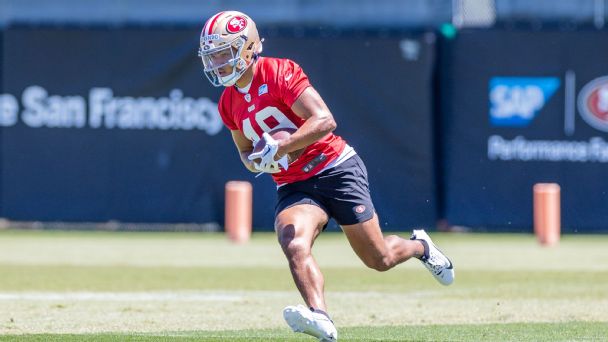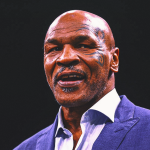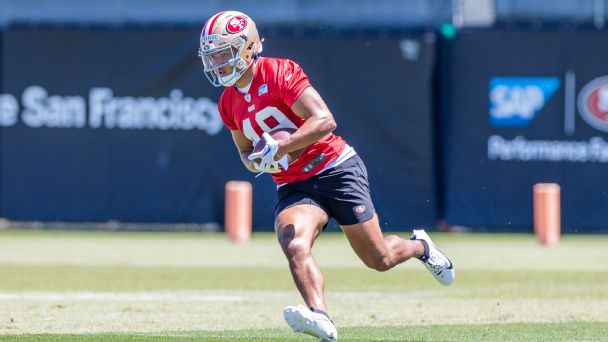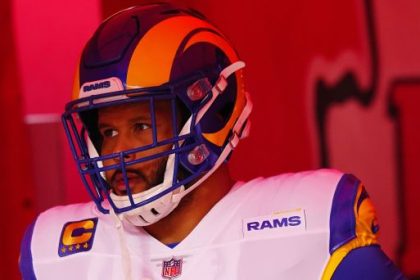
SANTA CLARA, Calif. — Since general manager John Lynch and coach Kyle Shanahan took over in 2017, the San Francisco 49ers haven’t been much for conventional wisdom when it comes to roster building.
Where other teams have zigged — spending conservatively on positions such as running back, off-ball linebacker and tight end — the Niners have zagged, unafraid to pay the player rather than the position.
With a roster reckoning coming in 2025 in which they’re expected to have to make multiple big decisions, the Niners signed star running back Christian McCaffrey to a two-year, $38 million extension through 2027 on June 4.
That deal offered a bit of certainty to one position that was previously up in the air, even if it meant betting big that McCaffrey will continue to produce like the NFL’s Offensive Player of the Year into his 30s.
“You think of things and you think of your history, you think of the history of whatever numbers you want to read, you think of how your roster is, where it’s going to be and then you think of the individual and then you try to figure it all out what’s best,” Shanahan said. “I like to say we don’t think in absolutes in anything we do. So, we’re never going to say, ‘Hey, we don’t do this at this age or we don’t do this for this position.’ Each individual is unique.”
Indeed, McCaffrey has been a singular talent since the Niners acquired him at the 2022 trade deadline. In the 27 regular-season games since, McCaffrey leads the NFL in scrimmage yards per game (119.7, which is 13.1 yards more per game than the next closest player), total touchdowns scored (31) and first downs gained (180).
Of course, McCaffrey is also third in the NFL in touches (550) in that time, including a whopping 417 in 2023 spread across the regular and postseason. That was 49 more than Tampa Bay Buccaneers running back Rachaad White, who was second in that category.
To be sure, that’s a lot of mileage on the odometer for McCaffrey, who turned 28 three days after signing his extension. And with $24 million total guaranteed over the next two seasons and a manageable cap number ($9.7 million) in 2026, he is likely to be on the roster through the 2026 season after he turns 30.
Historic trends would suggest a running back won’t continue to be as productive as McCaffrey has been into his 30s, but the Niners and McCaffrey have no such concerns.
“I’ve never really listened to all that stuff,” McCaffrey said. “I think I’ve seen a lot of backs have a lot of success in their 30s, so I, I’ve never really listened to any of that.”
Even with McCaffrey under contract for the next four years, the Niners could be in the midst of a changing of the guard at running back. Like at wide receiver, San Francisco has pending free agents dotting the running back depth chart and has already begun planning for the future.
Veteran backup Elijah Mitchell has averaged 4.7 yards per carry in his three seasons, but played in just 27 regular-season games because of myriad injuries. He’ll be an unrestricted free agent after the season. Jordan Mason has also produced in limited opportunities (5.6 yards per carry on 83 attempts) but he will be a restricted free agent in 2025.
That’s why the 49ers traded up in the fourth round of April’s draft for speedy back Isaac Guerendo and signed running back Cody Schrader as an undrafted free agent out of Missouri. When that duo will step into roles in the offense remains to be seen, but it’s clear the Niners have a succession plan in place if Mitchell and/or Mason don’t return in 2025 or become desirable trade targets this year.
And while McCaffrey is still the focal point not only at the position but for the entire offense, it’s possible the Niners could begin looking for more ways to spell him as a means to keep him running at or close to full speed over the next few years.
“We have guys that can run the ball,” Shanahan said. “We have to protect Christian from himself. He doesn’t like to ever come out no matter what the situation is and I do think that’s something we could protect him with more… If he’s just taking the wear and tear with 20 carries and stuff every game and he’s definitely good enough to do that and he has proved he can stay healthy. But you’d like to take some of that off of him and give it to other guys also.”
Guerendo, in particular, offers an element — he clocked a 4.33-second 40-yard dash at the NFL combine — the Niners haven’t had at the position since Raheem Mostert departed in 2022.
That speed might be enough to get Guerendo on the field early as a kick return option, though the 49ers are still sorting through their options because of league rule changes.
“We received consensus feedback that he was our type of guy, that he would be a perfect fit for our culture here,” 49ers director of player personnel Tariq Ahmad said. “We felt very comfortable there and then we used our eyes to evaluate the talent and the speed, the explosiveness, the strength he has in his body. We felt that they fit us.”
All of which makes running back an intriguing position to watch for the 49ers as they head into training camp and the 2024 season. During the offseason program, Mitchell got the bulk of the work with the first team with Mason mixing in as Guerendo and Schrader began learning the offense.
With the more proven Mitchell and Mason around, it won’t be easy for either rookie back to make an impact in the short term but rapid development could give the Niners an opportunity to deal from the position come cutdown day.
It’s a “problem” any team would love to have if it pans out that way, though there’s a lot that can happen between now and then.
“I’m not thinking about whether a guy is in his first year, second year, or contract year, I don’t get into that,” running backs coach Bobby Turner said. “Whether we drafted a player or we signed a player as a free agent, if he can help us win, I’m going to help develop him.”












